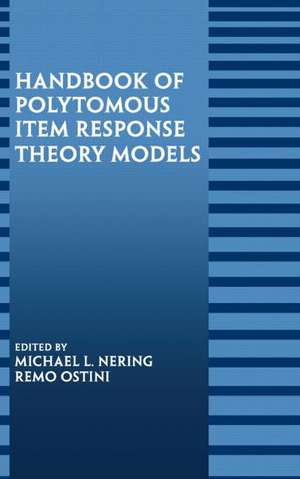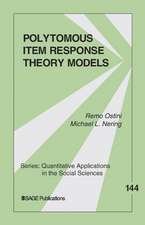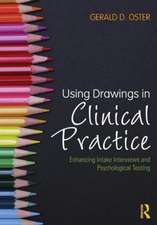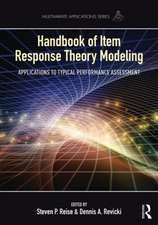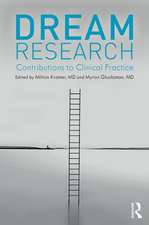Handbook of Polytomous Item Response Theory Models
Editat de Michael Nering, Remo Ostinien Limba Engleză Hardback – 6 apr 2010
Part 1 examines the most commonly used polytomous IRT models, major issues that cut across these models, and a common notation for calculating functions for each model. An introduction to IRT software is also provided. Part 2 features distinct approaches to evaluating the effectiveness of polytomous IRT models in various measurement contexts. These chapters appraise evaluation procedures and fit tests and demonstrate how to implement these procedures using IRT software. The final section features groundbreaking applications. Here the goal is to provide solutions to technical problems to allow for the most effective use of these models in measuring educational, psychological, and social science abilities and traits. This section also addresses the major issues encountered when using polytomous IRT models in computerized adaptive testing. Equating test scores across different testing contexts is the focus of the last chapter. The various contexts include personality research, motor performance, health and quality of life indicators, attitudes, and educational achievement.
Featuring contributions from the leading authorities, this handbook will appeal to measurement researchers, practitioners, and students who want to apply polytomous IRT models to their own research. It will be of particular interest to education and psychology assessment specialists who develop and use tests and measures in their work, especially researchers in clinical, educational, personality, social, and health psychology. This book also serves as a supplementary text in graduate courses on educational measurement, psychometrics, or item response theory.
Preț: 578.13 lei
Preț vechi: 680.15 lei
-15% Nou
Puncte Express: 867
Preț estimativ în valută:
110.62€ • 115.50$ • 91.56£
110.62€ • 115.50$ • 91.56£
Carte tipărită la comandă
Livrare economică 04-18 aprilie
Preluare comenzi: 021 569.72.76
Specificații
ISBN-13: 9780805859928
ISBN-10: 0805859926
Pagini: 306
Dimensiuni: 178 x 254 x 23 mm
Greutate: 0.73 kg
Ediția:New.
Editura: Taylor & Francis
Colecția Routledge
Locul publicării:Oxford, United Kingdom
ISBN-10: 0805859926
Pagini: 306
Dimensiuni: 178 x 254 x 23 mm
Greutate: 0.73 kg
Ediția:New.
Editura: Taylor & Francis
Colecția Routledge
Locul publicării:Oxford, United Kingdom
Public țintă
PostgraduateCuprins
Part 1. Development of Polytomous IRT Models. R. Ostini, M. Nering, New Perspectives and Applications. R. Hambleton, W. van der Linden, C. Well, IRT Models for the Analysis of Polytomously-Scored Data: Brief and Selected History of Model Building Advances. D. Thissen, L. Cai, R.D. Bock, The Nominal Categories Item Response Model. F. Samejima, The General Graded Response Model. G. Masters, The Partial Credit Model. D. Andrich, Understanding the Response Structure and Process in the Polytomous Rasch Model. Part 2. Polytomous IRT Model Evaluation. R.D. Bock, R. Gibbons, Factor Analysis of Categorical Item Responses. C.A.W. Glas, Testing Fit to IRT Models for Polytomously Scored Items. Part 3. Application of Polytomous IRT Models. C. Huang, R. Mislevy, An Application of the Polytomous Rasch Model to Mixed Strategies. A. Boyd, B. Dodd, S. Choi, Polytomous Models in Computerized Adaptive Testing. S. Kim, D. Harris, M. Kolen, Equating with Polytomous Item Response Models.
Recenzii
"I am excited to share this book with graduate students and fellow IRT researchers. ... There is a lot of rich information in here that helps even seasoned IRT researchers develop a greater appreciation and understanding. ... It is one of the most useful measurement-related edited volumes that I have read and I will be referring to this book for years to come." - Michael Zickar, Bowling Green State University, USA, in The American Statistician
"This really is a ‘must read’ for measurement students and specialists alike. An outstanding group of authors explain the models, clarify misconceptions, and offer new historical material, methods for evaluating model fit, and innovative applications." - Edward Haertel, Stanford University, USA
"It will likely become a standard reference on polytomous IRT analyses …I would definitely buy it and recommend it. I would most likely use it for an advanced IRT course." - Mark D. Reckase, Michigan State University, USA
" I expect this book will quickly become a seminal resource for researchers and practitioners… it will … have a large impact on the measurement community... Nering and Ostini have put together a very impressive group of experts in the area of polytomous IRT modeling. … This book fills a big gap … I would certainly purchase the book and use it in teaching my advanced IRT classes." - Terry Ackerman, University of North Carolina, Greensboro, USA
"An outstanding collection of original chapters by the principal developers of polytomous IRT models, supplemented by important contributions on model evaluation and example applications. This book will be a standard reference on these models for years to come." - David J. Weiss, Professor of Psychology, University of Minnesota, USA
"This really is a ‘must read’ for measurement students and specialists alike. An outstanding group of authors explain the models, clarify misconceptions, and offer new historical material, methods for evaluating model fit, and innovative applications." - Edward Haertel, Stanford University, USA
"It will likely become a standard reference on polytomous IRT analyses …I would definitely buy it and recommend it. I would most likely use it for an advanced IRT course." - Mark D. Reckase, Michigan State University, USA
" I expect this book will quickly become a seminal resource for researchers and practitioners… it will … have a large impact on the measurement community... Nering and Ostini have put together a very impressive group of experts in the area of polytomous IRT modeling. … This book fills a big gap … I would certainly purchase the book and use it in teaching my advanced IRT classes." - Terry Ackerman, University of North Carolina, Greensboro, USA
"An outstanding collection of original chapters by the principal developers of polytomous IRT models, supplemented by important contributions on model evaluation and example applications. This book will be a standard reference on these models for years to come." - David J. Weiss, Professor of Psychology, University of Minnesota, USA
